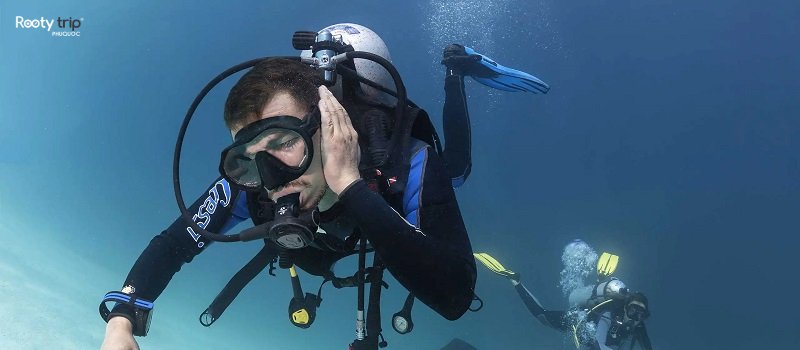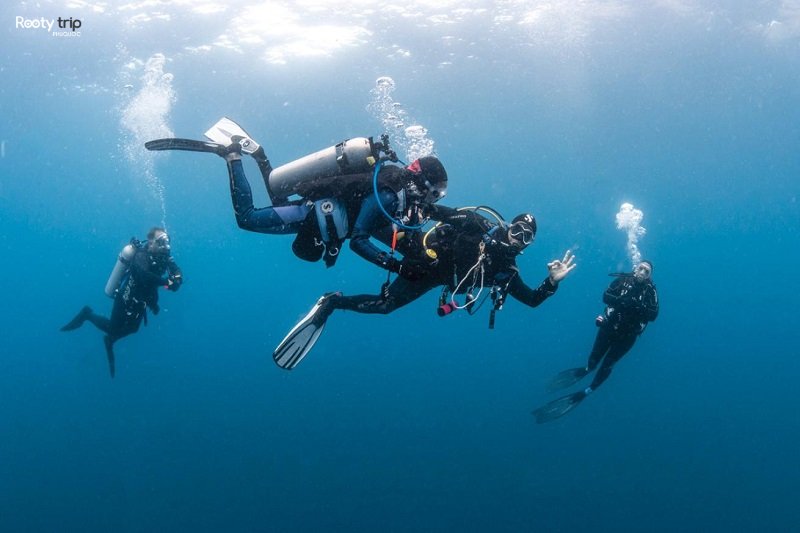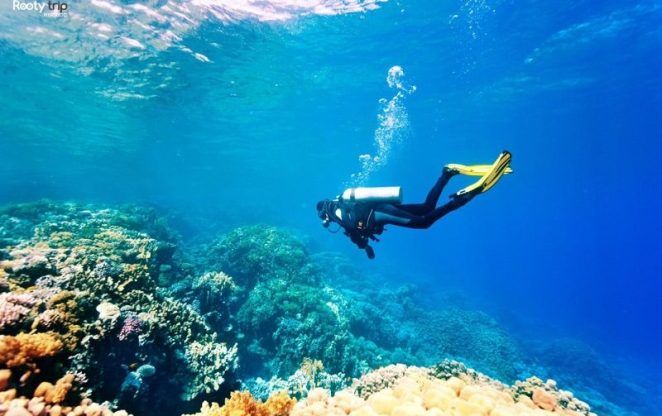Facing Problems While Scuba Diving? Here’s What to Expect
Snorkeling - Fishing
Scuba diving is a great activity to explore the ocean, but because it is risky, it also poses common scuba diving problems. Health problems associated with scuba diving can include environmental stress, equipment, and technical problems, all of which need to be understood and prevented. Below are the risks, problems, and ways to help you scuba dive safely. Let’s find out details with Rooty Trip!
Common health problems when scuba diving

Common health problems when scuba diving
It is impossible to predict all common scuba diving incidents because they can happen at any time. So, how to handle problems when scuba diving? First, you need to pay attention to the health problems you may encounter when diving so that you can find the best way to handle and prevent them, thereby having a safe and enjoyable diving trip.
Ear injuries and pressure problems
One of the common problems when scuba diving is ear injuries, caused by water pressure putting pressure on the eardrum. When going deep, the pressure increases rapidly and can damage the ear if you don’t know how to adjust the pressure. Thoroughly learning about safe scuba diving tips and things to know, and learning how to balance pressure, etc., is very important for safe scuba diving.
Decompression Sickness
Decompression sickness is a serious scuba diving health problem that occurs when a diver surfaces too quickly without adjusting properly. To minimize this risk, follow the diving rules, surface slowly, and have time to rest between dives.
Asphyxiation due to breathing equipment or air
Faulty breathing equipment or depleted air in the tank can cause suffocation, which is one of the most common scuba diving incidents. Risks of scuba diving and how to avoid them include carefully checking your equipment before entering the water and always keeping a spare air tank.
Injury due to changes in temperature and climate
Injuries due to changes in temperature and climate are also common problems when scuba diving. Sudden temperature changes between shore and underwater can lead to muscle cramps or even heat stroke, which is dangerous for divers. To scuba dive safely, you need to pay attention to wearing appropriate diving gear and warming up your body before diving.
Uncontrolled buoyancy
Uncontrolled buoyancy is a risk when diving, causing divers to easily lose balance and encounter problems, especially when surfacing too quickly. So how do you handle this problem when diving? Learn how to control the flotation device to ensure safe depth adjustment.
Panic and stress
One of the dangers of scuba diving that can be seen in beginners is easily panicking and stress. Learn clearly about safe scuba diving rules and important notes, practice mental control and breathing skills to stay calm when faced with difficult situations.
Fatigue when diving
Diving for a long time will easily cause fatigue, reducing the ability to concentrate, which is one of the common problems when scuba diving. To minimize this unwanted scuba diving risk, rest and don’t push yourself too hard to dive, which will help you maintain energy and focus.
There are quite a few health problems that can occur when scuba diving. However, if you learn clearly how to handle common problems when diving, you will have a safer, more enjoyable diving trip with less risk.
Technical problems when scuba diving and how to handle them

Technical problems when scuba diving and how to handle them
Diving equipment malfunction (e.g. air tank, mask, fins)
Failure of diving equipment, such as tanks, masks, or fins, is a common scuba diving problem. To limit risks, carefully check equipment before diving and have a backup plan for important equipment.
Lost or disoriented underwater
Getting disoriented is one of the common problems when scuba diving. Always dive with a partner or have a navigation device to avoid getting lost.
Stuck on a reef or obstacle
Getting stuck on a coral reef or obstacle is one of the risks when scuba diving and the best way to prevent it is to limit diving too close to the reef and move carefully to avoid getting stuck.
How to handle emergency situations underwater
How to handle common problems when scuba diving includes emergency handling skills such as stopping, breathing slowly and staying calm. This is a way to help minimize panic when encountering unexpected problems.
Improper fin swimming technique
Improper fin swimming technique is also one of the common problems when scuba diving, causing divers to easily become exhausted or have difficulty controlling their movements. Learn and practice correct technique to ensure safe scuba diving.
Conclude
Scuba diving is a great activity, but it also comes with the potential for common scuba diving problems. To ensure safety, prepare carefully, understand common scuba diving problems, and practice appropriate solutions.
End the article with FAQ:
Why can scuba diving cause ear injuries?
- Scuba diving can cause ear injuries due to underwater pressure directly impacting the eardrum. This is also a risk when scuba diving that is common to many people. To minimize the risk, learn how to equalize ear pressure.
What is decompression sickness and how to prevent it?
- Decompression sickness is a phenomenon in which nitrogen gas in the body does not have time to escape when it rises quickly. To prevent it, ascend slowly and rest between dives.
How often do diving equipment problems occur?
- Equipment problems are also common problems when scuba diving, so careful inspection and regular maintenance are needed to ensure safety.
How to scuba dive more safely if you are a newbie?
- To scuba dive safely, learn basic techniques, practice breathing, and fully check your equipment before each dive.
ROOTY TRIP PHU QUOC
Address: 191 Tran Hung Dao Street, Cua Lap Hamlet, Duong To Commune, Phu Quoc Island, Kien Giang
Phone/Whatsapp: 0886.068.886 – 033.906.2222
Email: cskh@rootytrip.com
Fanpage: https://www.facebook.com/rootytripphuquoc/
Instagram: https://www.instagram.com/rootytrip/
Comment
Leave comments & reviews
Login to comment & rate










